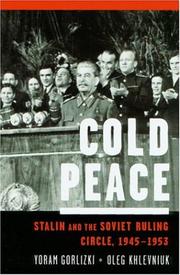
Cold peace
By Yoram Gorlizki
Subjects: Stalin, joseph , 1879-1953, Politics and government, Influencestalin, joseph , 1879-1953, Friends and associatesstalin, joseph , 1878-1953, Nonfiction, Stalin, joseph , 1878-1953, Stalin, joseph, 1879-1953, Friends and associates, Friends and associatesstalin, joseph , 1879-1953, Psychologystalin, joseph , 1879-1953, 947.084/2/092, Soviet union, politics and government, History, Psychology, Dk268.4 .g67 2004, Influence
Description: Following his country's victory over Nazi Germany, Joseph Stalin was widely hailed as a great wartime leader and international statesman. Unchallenged on the domestic front, he headed one of the most powerful nations in the world. Yet, in the period from the end of World War II until hisdeath, Stalin remained a man possessed by his fears. In order to reinforce his despotic rule in the face of old age and uncertain health, he habitually humiliated and terrorized members of his inner circle. He had their telephones bugged and even forced his deputy, Viacheslav Molotov, to betray hisown spouse as a token of his allegiance.Often dismissed as paranoid and irrational, Stalin's behavior followed a clear political logic, contend Yoram Gorlizki and Oleg Khlevniuk. Stalin's consistent and overriding goal after the war was to consolidate the Soviet Union's status as a superpower and, in the face of growing decrepitude, tomaintain his own hold as leader of that power...
Comments
You must log in to leave comments.